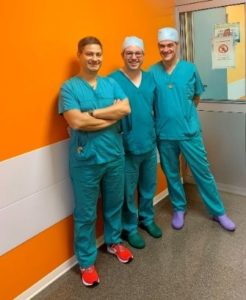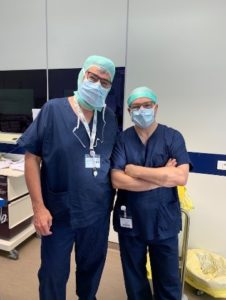
SSO offers several global opportunities to share surgical oncology knowledge. These programs range from the International Career Development Exchange program to several Observerships. These ongoing programs are collaborative activities with SSO’s partner societies. Recently, Jeffrey Farma, MD, from Fox Chase Cancer Center, traveled to Europe to attend the 39th Congress of the European Society of Surgical Oncology in Rotterdam and then visited the Instituti Tumori in Milan, Italy and Centre Léon Bérard In Lyon, France. Dr. Farma shares his experiences below.
Q. What was appealing about the ESSO Observership?
A. I find it very intriguing to understand how surgeons around the world evaluate and interact in a multidisciplinary setting, how they train to become surgical oncologists and how they collaborate for clinical trials. At the Centre Léon Bérard, the training was very similar to a one-to-one apprenticeship model, which was great. I was also interested in learning more about different peritoneal disease clinical trials in Europe and novel techniques that are being conducted.
Q. What were your personal objectives for this program?
A. Some of my objectives included building new connections for future collaborations and to simply interact with world experts in surgical oncology.

Q. What were some of your key takeaways from this experience?
A. I was able to attend multidisciplinary tumor boards at both centers I visited. I found it interesting to see the level of autonomy that was given to trainees and the overall level of collaboration across the teams. In France at the Centre Léon Bérard, there is an emphasis on national clinical trials and having centers of excellence. The infrastructure for this research was impressive. The Instituti Tumori in Milan is a renowned sarcoma center with a high-volume of patients from across Europe. They have been at the forefront of creating international collaborations for rare tumors, including an international database. I was impressed at the amount of research and translational research that everyone on their team is involved in, where they were sectioning the specimen in the operating room and creating a photographic atlas for complex sarcoma operations.
Q. Was there any information or practices that you will share with your colleagues or integrate into your own practice?
A. At Centre Léon Bérard, there is a significant use of FOLFIRINOX for preoperative colorectal cancer with very good response rates. Considering more aggressive chemotherapy regimens before surgery, especially in younger patients, is something that deserves consideration here.
We all speak the language of surgery and have this innate link and are driven to improve patients’ lives using any tools that we have available. It’s very interesting to see that we’re all doing very similar things, but it’s also great to see the little nuances that exist. It has helped me mature as a surgeon, educator and as a mentor. I encourage everyone to take advantage of these types of opportunities at some point in their career.